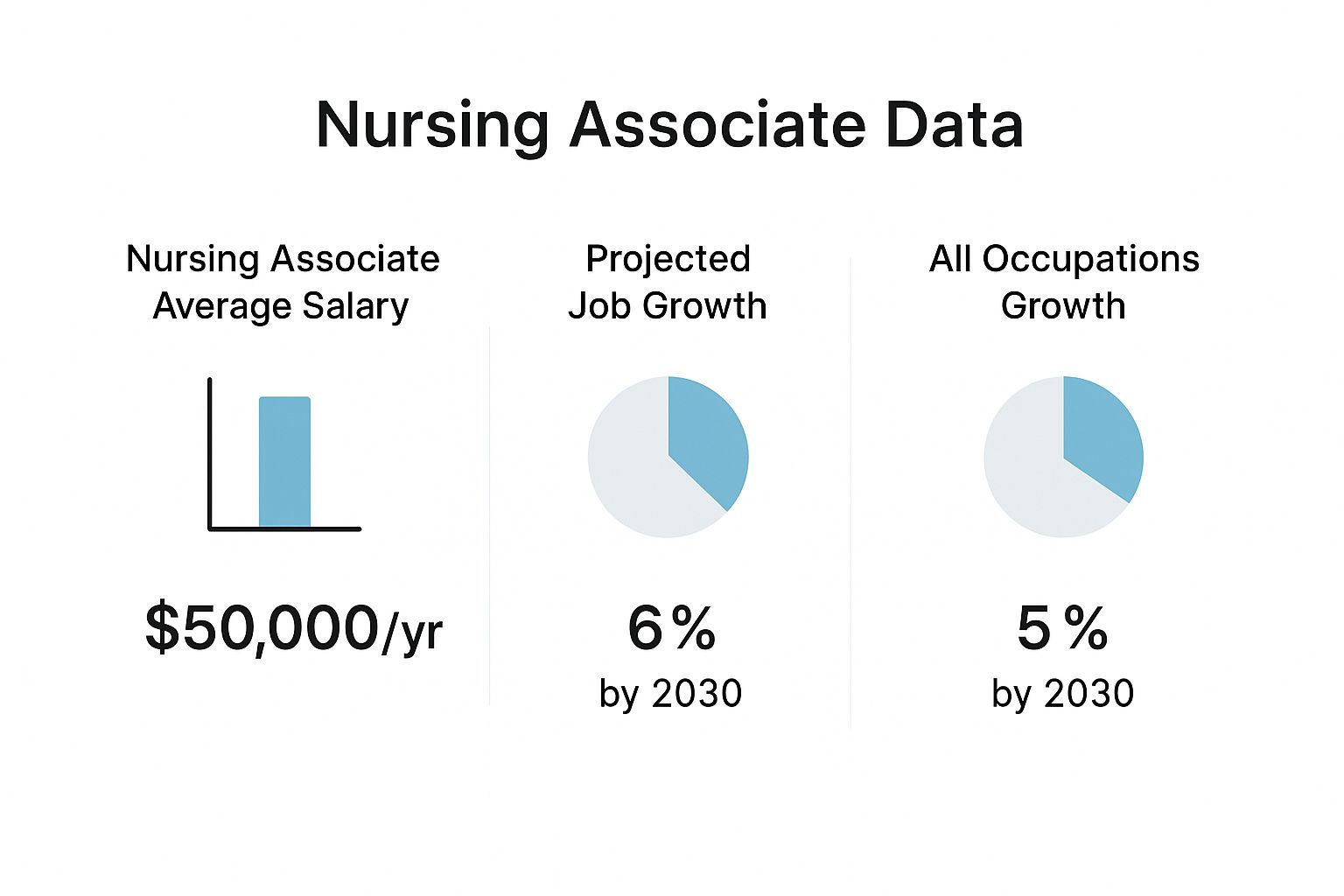Think of a nursing associate degree as your direct entry into a hugely important healthcare role. It’s the qualification that puts you right at the heart of patient care, serving as a vital link between healthcare assistants and registered nurses. This is a two-year, Level 5 qualification that perfectly mixes academic learning with real, hands-on clinical experience, getting you ready to deliver top-quality care.
The Nursing Associate Role in Modern Healthcare
If you picture a healthcare team as a finely tuned orchestra, the registered nurse is the conductor, overseeing the entire performance and making the big calls. Healthcare assistants are the essential stage crew, making sure everything runs smoothly behind the scenes. So where does the nursing associate fit in? They are the skilled principal musicians, with the specific training and talent to perform key parts of the symphony with real precision.
This role was created for a reason: to strengthen the very backbone of patient care. It offers a clear, achievable career ladder for people who want to step into the nursing world but aren't ready to commit to a full three-year degree from the get-go. The nursing associate degree, which is a Foundation Degree, is the specific qualification designed to give you both the competence and the confidence this position demands.
Bridging a Critical Gap
The introduction of the nursing associate role was a smart move to tackle some big challenges within the NHS. For years, the system has been under immense strain due to a constant shortage of registered nurses. The role was rolled out nationally in England in 2017 to help ease this pressure, which was a direct response to ongoing staff shortages—with vacancy rates hitting around 34,700 for qualified nursing posts in England as of 2024. You can read more about the policy responses to NHS workforce challenges and see just what a difference this is making.
By establishing this regulated profession, the NHS found a way to support registered nurses by allowing them to delegate tasks appropriately. This, in turn, has boosted patient safety and improved the overall care experience. Nursing associates work across all four main fields of nursing—adult, children’s, mental health, and learning disability—making them incredibly versatile and valuable members of any healthcare team.
It’s important to remember that a nursing associate isn't a "junior nurse," but a distinct and respected professional in their own right. They bring a unique set of skills that complements the wider team, improving the quality and continuity of care for patients and their families.
Key Characteristics of the Role
To give you a clearer picture of what the degree prepares you for, let's look at the key elements of the nursing associate role. This is a regulated profession with a specific scope of practice designed to ensure patient safety is always the top priority.
Here's a quick summary of what the role involves:
Nursing Associate Role at a Glance
| Characteristic | Description |
|---|---|
| Qualification Level | Level 5 Foundation Degree, regulated by the Nursing and Midwifery Council (NMC). |
| Course Duration | Usually a two-year, full-time programme, often run as an apprenticeship. |
| Core Focus | Blends hands-on clinical tasks with foundational nursing theory and person-centred care. |
| Primary Responsibilities | Performing clinical observations, administering approved medications, wound care, and health promotion. |
| Career Pathway | Provides a direct route to register as a Nursing Associate and a stepping stone to a Registered Nurse degree. |
Ultimately, finishing a nursing associate degree isn't just about getting a certificate. You're stepping into a purpose-built role designed to make a real, tangible impact on the health and wellbeing of your community. It’s a career that requires technical skill and a whole lot of heart, and it's rewarding from day one.
Meeting the Entry Requirements
Getting a spot on a nursing associate degree programme is well within reach, but it does ask for a particular mix of qualifications, hands-on experience, and personal character. Think of it like building a case for why you’re a great fit for a career in care. Every single piece—from exam results to your life experience—is another bit of evidence showing your potential.
Universities and employers don't set these standards to put up walls. They're there to make sure every trainee has the solid foundation needed for what is a very demanding and responsible role. Let's break down exactly what you’ll need to put together a successful application.

Core Academic Foundations
Before you can get stuck into the complexities of patient care, you need to have a firm grip on the basics. That’s why most applications start with foundational qualifications that prove your numeracy and literacy skills.
Typically, you're going to need:
- GCSEs: Most programmes ask for a Grade C / 4 or above in both Maths and English Language.
- Equivalent Qualifications: Don't have GCSEs? Functional Skills Level 2 in Maths and English are usually accepted as an alternative.
These aren't just boxes to tick. Strong numeracy is absolutely vital for everyday tasks like calculating medication dosages, monitoring a patient's fluid intake, and reading vital signs—situations where accuracy can be a matter of patient safety. In the same way, clear literacy skills are essential for writing precise patient notes, understanding complex care plans, and communicating clearly with patients and their families.
For anyone coming back to education after a break, you might not have these specific qualifications. That's okay, there are other routes. If you need to get the qualifications to apply, an Access to Higher Education Diploma in Nursing is designed to get you ready for university-level study.
The Value of Real-World Experience
While your academic qualifications are a crucial starting point, they only tell part of the story. Universities put a huge amount of value on applicants who have spent time in a health or social care setting. This kind of experience shows your commitment and gives you a realistic feel for what the job truly involves.
It proves you've seen the challenges and the rewards of front-line care with your own eyes. This experience can come from all sorts of roles, whether they were paid or voluntary.
For example, you might have worked as:
- A Healthcare Assistant in a hospital or GP surgery.
- A Care Worker in a residential home.
- A Support Worker helping individuals with learning disabilities.
This practical background shows you can handle the demands of a care environment. More importantly, it shows you’ve already started building the empathy and resilience you'll need to succeed.
"Selectors are looking for more than just grades. They want to see evidence of your compassion, your ability to communicate under pressure, and your genuine desire to care for others. Your experience is where these qualities shine through."
Essential Personal Qualities and Checks
Beyond certificates and your work history, who you are as a person is absolutely fundamental. The best nursing associates are built on a foundation of strong personal values and brilliant people skills.
During your application and interview, you’ll need to show you have:
- Compassion and Empathy: The ability to really connect with patients on a human level.
- Resilience: The strength to handle situations that are emotionally and physically draining.
- Communication Skills: The clarity to explain information to patients and work well with colleagues.
Finally, every successful applicant has to go through mandatory safeguarding checks. This is to make sure you are suitable for working with vulnerable people. You'll need to complete a Disclosure and Barring Service (DBS) check and an occupational health screening. These are just standard procedures designed to protect both you and the patients you'll be looking after, and they're the final step on your path to acceptance.
How the Course Is Structured
Signing up for a nursing associate degree means committing to a dynamic, two-year journey. This isn't your typical academic course where you're just buried in textbooks. Instead, it’s a hands-on experience designed to skilfully blend classroom theory with real-world clinical practice, building your competence and confidence in equal measure.
Think of it like learning to be a chef. Your time in the classroom is like studying recipe books – you learn the science behind ingredients, understand food safety, and master the theory of flavour. But you can't truly become a chef until you step into a busy kitchen. The clinical placements are your time in that bustling kitchen, applying what you've learned under real pressure and honing your craft with every patient you meet.
This dual approach is the heart of the programme. The academic modules give you the "why" behind patient care, while the placements teach you the "how," creating a powerful and effective learning cycle.
Finding the Right Balance Between Theory and Practice
A nursing associate degree is carefully designed to be a 50/50 split – roughly 50% academic learning and 50% practical experience in clinical settings. This balance is key, as it ensures you’re not just memorising facts but actively applying them, which deepens your understanding and makes you a much more capable practitioner.
Your university-based learning covers all the essential knowledge needed to provide outstanding care. These modules are the building blocks of your clinical skills.
You can expect to dive into topics like:
- Anatomy and Physiology: Getting to know the human body and how it works.
- Pharmacology: Learning about medications, their uses, and how to administer them safely.
- Person-Centred Care: Focusing on the individual needs and values of every patient.
- Professional and Ethical Practice: Grasping the legal and ethical duties that come with the role.
- Health Promotion: Understanding how to support patients in making healthy lifestyle choices.
These academic blocks are often taught through a mix of lectures, seminars, and practical sessions in university simulation suites. These simulated environments are fantastic, allowing you to practise skills like taking blood pressure or dressing a wound on medical manikins in a safe, controlled space before you work with real patients.
Gaining Hands-On Experience in Different Placements
The other half of your time is spent on clinical placements, where you'll apply everything you've learned in a variety of healthcare settings. These experiences are absolutely crucial for your development, exposing you to the full spectrum of patient care and helping you discover where your passions truly lie.
A core requirement of the programme is to gain experience across different fields of nursing. This means you'll work in settings that care for adults, children, and individuals with mental health conditions or learning disabilities, giving you a truly well-rounded perspective.
Your placements will take you to all sorts of locations. One month you might be on a fast-paced surgical ward in a major hospital; the next, you could be providing support in a community mental health clinic. This variety is deliberately designed to make you a versatile and adaptable professional.
How Your Progress Is Assessed
Throughout the nursing associate degree, you’ll be assessed continuously. It’s a multifaceted approach that tests both your knowledge and your practical skills. You won't be judged on one big final exam; instead, your progress is tracked through a combination of methods.
This typically includes:
- Written Assignments and Essays: These test your understanding of nursing theory and your ability to research and articulate complex ideas clearly.
- Exams: Formal exams are used to assess your grasp of core subjects like anatomy and pharmacology.
- Presentations: These help develop your communication skills and your confidence in sharing information with colleagues.
- Practice Assessment Document (PAD): This is arguably the most important piece of the puzzle. The PAD is a comprehensive portfolio you complete on your placements. Your supervising registered nurses will sign off on your skills as you master them, creating an official record that proves you can perform clinical tasks safely and effectively.
This blended assessment model ensures that by the time you complete your nursing associate degree, you’ve proven your competence in every aspect of the role. You'll be ready to register with the Nursing and Midwifery Council (NMC) and start your rewarding career.
A Day in the Life of a Nursing Associate
Ever wondered what it’s really like to be a nursing associate? That pre-dawn alarm buzzes, signalling the start of a day that promises to be fast-paced, challenging, and incredibly rewarding. The role is so much more than a job description; it's a dynamic mix of clinical expertise, sharp instincts, and genuine human connection.
To get a real feel for the difference a nursing associate degree makes, let's step onto the ward. This is where the classroom theory clicks into place and where your skills directly impact people's lives.

Morning Handovers and Initial Rounds
The shift kicks off with the morning handover. This is a critical briefing where the night staff bring the day team up to speed on every patient. It’s a rapid-fire exchange of vital information—from overnight observations to tweaks in a care plan. For a nursing associate, it's a moment of intense focus, absorbing the details that will dictate the priorities for the hours ahead.
Straight after, it’s time for the initial rounds. This is much more than just ticking boxes. It’s the first human contact for patients starting their day, a chance to offer a warm greeting, check they’re comfortable, and assess any immediate needs. A positive start can make all the difference.
This first part of the day is packed with key clinical tasks:
- Vital Signs Monitoring: You’ll be taking and recording blood pressure, heart rate, temperature, and oxygen levels for your assigned patients.
- Assisting with Morning Routines: This means helping patients who need support with personal care, always making sure their dignity and comfort come first.
- Breakfast Support: You’ll ensure patients get the right meals, assist with feeding if needed, and keep a close eye on their food and fluid intake.
These early interactions are crucial. They’re your opportunity to build rapport and get a baseline reading of each patient's condition, helping you spot subtle changes that might need flagging to a registered nurse.
Navigating Mid-Shift Responsibilities
As the morning rolls on, the pace picks up. This is where the core clinical skills from your nursing associate degree are constantly put to the test. One minute you could be administering medications from a prescribed list, meticulously checking dosages and patient details.
The next, you might be performing a wound dressing, using precise aseptic techniques to prevent infection and help the healing process. All the while, you’re updating patient records with absolute accuracy, ensuring every action and observation is documented for the rest of the team.
A nursing associate is often the eyes and ears of the ward. Your consistent, close contact with patients means you're frequently the first to spot when someone's condition is improving—or deteriorating. Your observations are invaluable.
Teamwork is everything. You'll work shoulder-to-shoulder with registered nurses to carry out care plans, liaise with physiotherapists to help a patient with mobility exercises, and communicate with doctors on their rounds. It’s a true team effort, and every person's contribution is vital for seamless patient care.
The Afternoon Focus on Support and Empathy
While the afternoon brings more clinical duties, it often allows more time for the person-centred side of the role. This might mean sitting with an anxious patient to offer a few words of reassurance before a procedure or taking a moment to explain a part of their care plan to a worried family member.
This blend of technical skill and genuine empathy is what makes a great nursing associate. It’s a dual focus that the nursing associate degree is specifically designed to prepare you for.
Key afternoon activities might include:
- Patient Education: Reinforcing health advice given by a registered nurse, like explaining how to manage a new medication.
- Preparing for Discharges: Helping get patients ready to go home by organising their take-home medications and discharge letters.
- Escalating Concerns: Reporting any changes or worries about a patient's health directly to the registered nurse in charge.
As the shift draws to a close, the final task is to prepare a detailed and accurate handover for the incoming evening team. This completes the cycle, ensuring the next shift has everything they need to provide the best possible care for every single patient.
Your Career Path After Qualifying
Finishing your nursing associate degree is a massive achievement. It’s the result of two years of hard work, dedication, and real-world practice. But this isn't the finish line; it’s the official starting block for a long and rewarding career in healthcare.
Once you qualify, the first thing on your to-do list is to register with the Nursing and Midwifery Council (NMC). This is more than just paperwork—it’s your formal entry into a respected and regulated profession. NMC registration is proof that you’ve met the high national standards for skill and knowledge, making you accountable for the care you provide and giving the public total confidence in your abilities.
The Path to Becoming a Registered Nurse
For many nursing associates, the ultimate ambition is to become a fully Registered Nurse (RN). The brilliant news is that your foundation degree is the perfect launchpad to get you there. Think of it like completing the first half of a marathon with expert coaching; you’ve already got a massive head start.
Instead of starting a three-year nursing degree from scratch, your qualification allows you to take a shortened "top-up" route. This usually means just another 18 to 24 months of study to build on the foundations you’ve already laid, bridging the gap to a full Bachelor of Science (BSc) in Nursing.
Many universities now offer specific programmes designed for qualified nursing associates because they recognise the incredible value and hands-on experience you bring to the table. Our guide on nursing degree entry requirements dives deeper into what universities are looking for.
To make things clearer, let's compare the pathways side-by-side.
Nursing Career Pathways Comparison
This table breaks down the typical journey for a Nursing Associate who decides to 'top-up' their qualification, versus someone starting a Registered Nurse degree from day one.
| Career Milestone | Nursing Associate Path | Registered Nurse Path (Direct Entry) |
|---|---|---|
| Initial Qualification | 2-year Foundation Degree (FdSc) | 3-year Bachelor's Degree (BSc) |
| Time to RN Status | 2 years (FdSc) + 1.5-2 years (Top-up) = 3.5-4 years total | 3 years total |
| Key Advantage | Earn while you learn as a Nursing Associate before topping up. Gain practical experience from the outset. | A direct, streamlined route to becoming a Registered Nurse. |
| First Professional Role | Nursing Associate | Registered Nurse |
As you can see, the 'top-up' route provides a fantastic, flexible way to progress your career while gaining invaluable experience and earning a salary along the way.
Opportunities for Growth and Specialisation
While becoming an RN is a popular choice, it's far from your only option. Your qualification opens doors to plenty of fulfilling career paths within the nursing associate role itself. You could work your way up to a senior nursing associate position, taking on more complex clinical duties, mentoring new trainees, or leading projects on your ward.
You can also choose to specialise in an area that truly sparks your passion. Maybe you discovered a love for paediatric care during your placements, or perhaps you feel drawn to the complexities of mental health nursing. You can seek out roles that let you become a highly skilled expert in these fields.
This infographic paints a clear picture of the promising career outlook for nursing associates.

The data shows that the profession not only offers a competitive salary but is also set to grow much faster than average, highlighting the strong and sustained demand for your skills.
The role is expanding rapidly, reflecting just how vital it has become to the NHS. In fact, as of March 2025, there were 12,782 nursing associates on the NMC register in England—a huge 17.5% increase from the previous year, making it the fastest-growing group on the professional register.
Whether you decide to top up to an RN degree, specialise in a niche area, or climb the ladder as a senior nursing associate, your foundation degree is the key that unlocks a future full of possibilities.
How to Apply Step by Step
Ready to turn your ambition into action? Applying for a nursing associate degree can feel like a massive project, but when you break it down into smaller steps, the whole journey feels clearer and a lot less intimidating. Think of this as your practical game plan for putting together a strong application that really shows off what you're made of.
The process is all about finding the right course for you, highlighting your unique strengths, and getting ready to impress when you get to the interview stage. Let's walk through it together so you can move forward with total confidence.

Finding and Shortlisting Courses
First things first: you need to find the right programme. The majority of nursing associate degree apprenticeships are advertised directly by NHS Trusts or other healthcare providers. This means your go-to search tools will be the NHS Jobs website and the government's Find an apprenticeship service.
For the less common direct entry university courses, you’ll typically apply through the UCAS portal. Whatever route you take, keep a close eye on application deadlines, as they can vary quite a bit between different trusts and universities.
Crafting a Compelling Personal Statement
Your personal statement is your moment to shine. It's so much more than just a list of your qualifications; it's the story that connects your life experiences and your passion for care with what the nursing associate role actually demands.
To make your statement really stand out, zero in on these areas:
- Your Motivation: Why do you want to be a nursing associate? What was the spark that inspired you?
- Relevant Experience: Link any previous roles—whether paid or voluntary—to the skills needed for the job. Try to show, not just tell.
- Key Qualities: Give short, powerful examples of times you’ve shown compassion, teamwork, or resilience.
If you’re still building up your qualifications to meet the entry criteria, an Access to Higher Education Diploma in Nursing is a fantastic way to prepare for the academic side of the degree. It also gives you plenty of great material to write about in your statement.
Preparing for the Interview
Getting an interview is a huge achievement, and preparation is everything. Interviewers are looking for proof that you understand the role and that your personal values align with theirs. A really popular way to structure your answers is by using the STAR method.
Situation: Briefly set the scene.
Task: Explain what you needed to do.
Action: Detail the specific steps you took to get it done.
Result: Share what the outcome was.
Using this technique helps you give clear, concise, and memorable examples that prove you have what it takes. Be ready to talk about why you want to work for that specific NHS Trust and show you've looked into their values.
Understanding Your Funding Options
Finally, it’s absolutely vital to get your head around how your training will be funded. The vast majority of nursing associate programmes are offered as employer-funded apprenticeships. This is a brilliant setup where your employer pays your university tuition fees, and you earn a salary while you learn on the job.
For the small number of direct-entry university courses, you would apply for funding through Student Finance England, just as you would for any other degree. This usually means applying for a tuition fee loan and a maintenance loan to help with your living costs. Always double-check the funding route when you apply to avoid any surprises.
Your Questions Answered
Starting a new career path always throws up a few questions. It’s completely normal. So, let’s clear up some of the most common things people ask about the nursing associate degree.
Is a Nursing Associate the Same as a Nurse?
Not quite, they're two distinct but related roles. Think of a nursing associate as a vital, regulated profession that works alongside registered nurses, supporting them in delivering patient care.
While they share a lot of the same clinical skills, a registered nurse has a wider scope of practice. This means they're responsible for the more complex patient assessments and managing the overall care plan from start to finish.
Can I Get Student Finance for This Course?
This really depends on how you study. The vast majority of nursing associate programmes are apprenticeships, which is great news because it means your employer covers your tuition fees and you earn a salary while you learn.
For the small number of direct-entry university courses, you would typically apply for funding through the usual route with Student Finance England.
The apprenticeship model is by far the most common way in. It’s a fantastic opportunity to get qualified without racking up any student debt, making it a practical and financially smart way into the profession.
How Much Can I Earn After Qualifying?
Your salary can vary a bit depending on the NHS Trust and where you are in the country, but as a newly qualified nursing associate, you can expect to start on a Band 4 salary within the NHS.
As of 2024, that’s over £25,000 per year. And of course, there are always opportunities to progress from there.
Do I Need an A-Level in Science?
Usually, no. The standard academic requirements for a nursing associate degree are typically GCSEs in Maths and English at Grade 4/C or above (or equivalent Level 2 qualifications).
While having an A-Level in a science subject is definitely helpful and will give you a good foundation, it's not an essential requirement for most programmes.
If you're aiming to meet the entry requirements for a nursing degree, Access Courses Online provides accredited online diplomas designed to get you university-ready. Find out how our flexible courses can help you start your journey at the Access Courses Online website.

